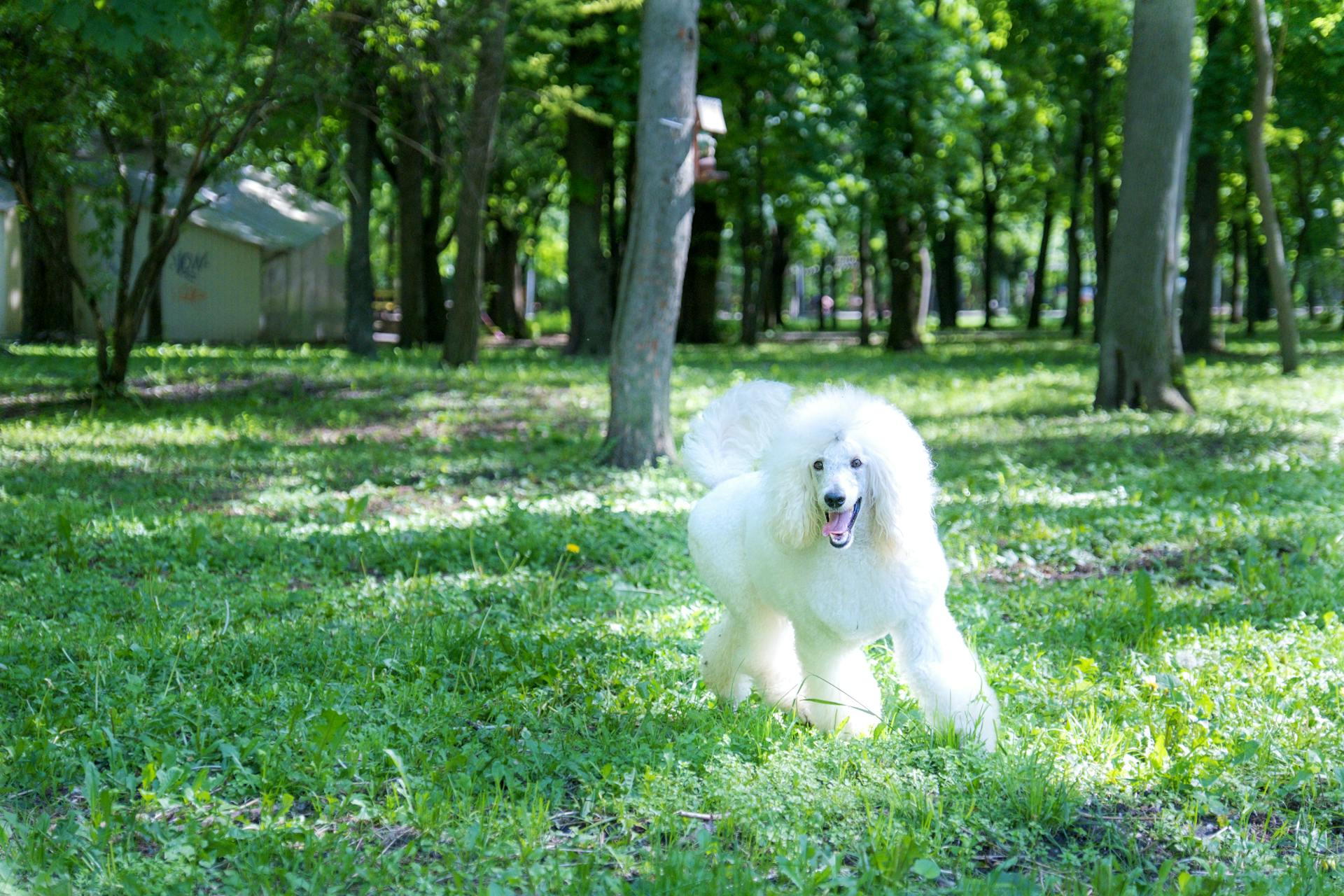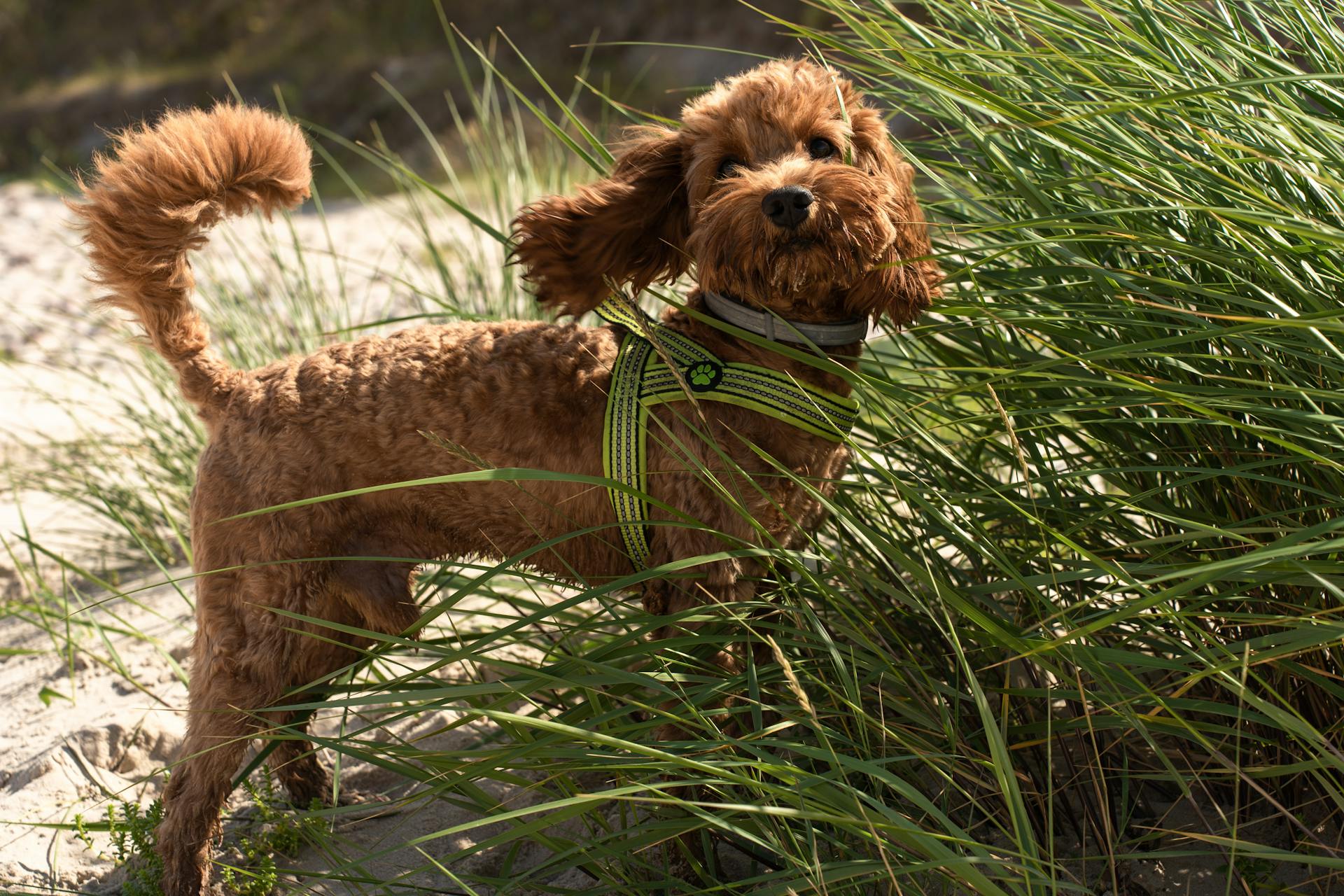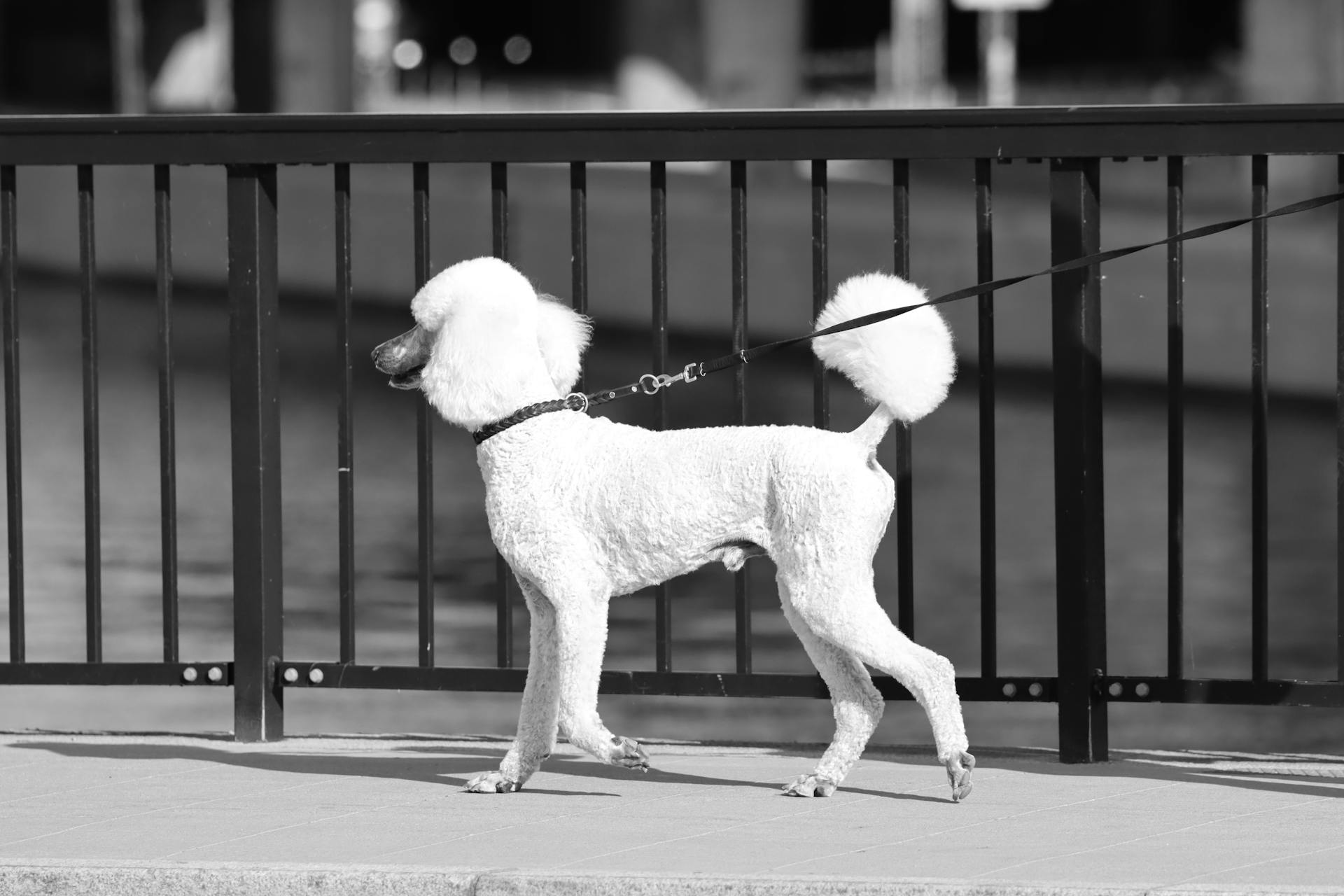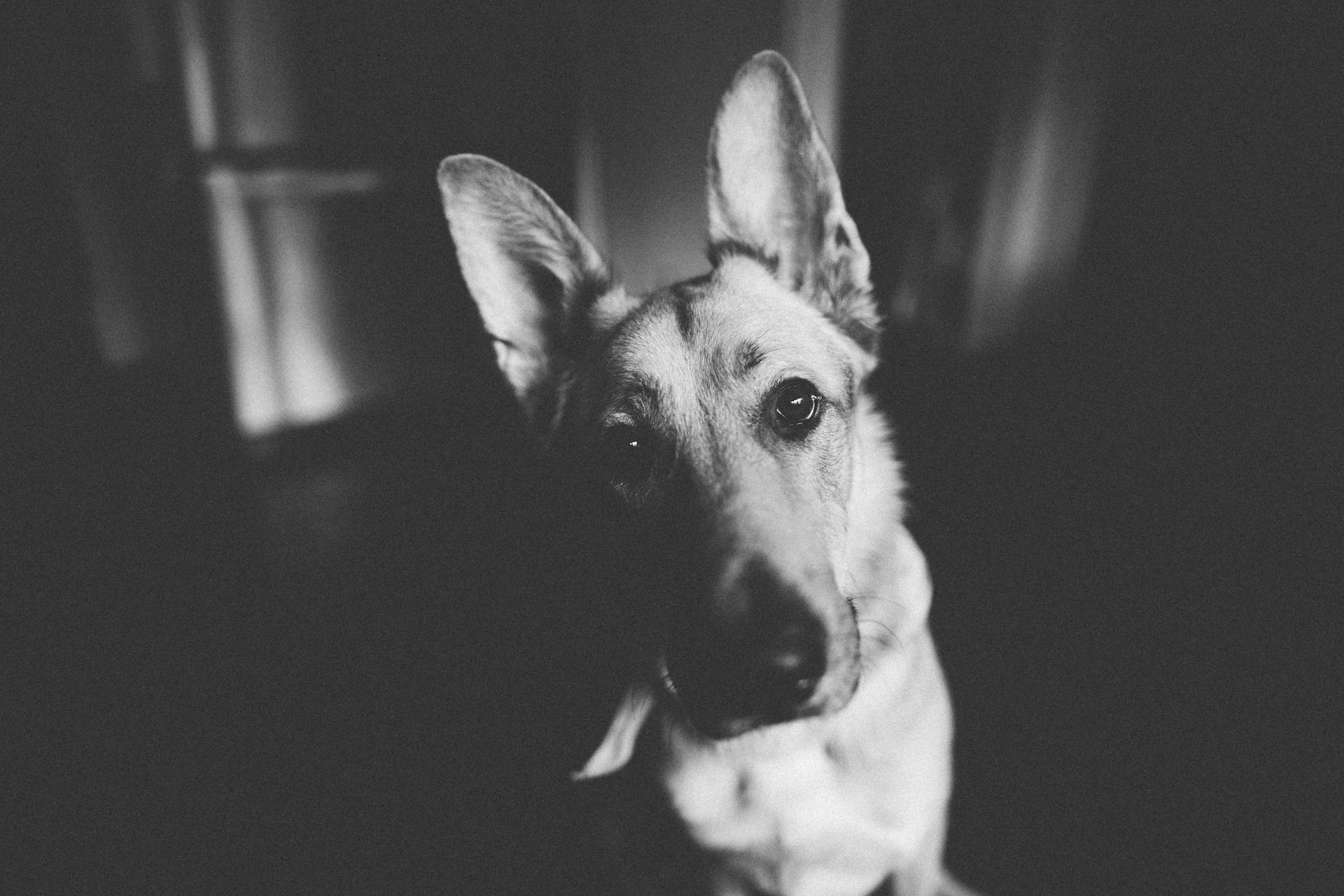
Miniature poodles are intelligent dogs that require regular grooming to prevent matting and tangling of their fur.
They need a balanced diet rich in nutrients to maintain their overall health, with an average lifespan of 12-15 years. This makes them a long-term companion for many families.
To ensure they get enough exercise, miniature poodles should be taken on daily walks and playtime sessions, lasting at least 30 minutes per day. Regular mental stimulation is also crucial to prevent boredom and stress.
Explore further: White Toy Poodles
What is a Miniature Poodle?
A Miniature Poodle is a small dog breed that typically weighs between 10 and 15 pounds.
They are known for their intelligence and trainability, ranking among the top three smartest dog breeds according to Stanley Coren's book "The Intelligence of Dogs". With proper training, they can learn hundreds of commands.
What Are They?
So, you're wondering what a Miniature Poodle is? Well, let me tell you - they originated in Germany but quickly gained popularity in France!
Miniature Poodles are full of personality, despite their small size! They were initially bred as water retrievers and have a natural affinity for the water. This makes sense, given that they're highly intelligent dogs who are considered one of the smartest dog breeds.
Here's a fun fact: Miniature Poodles typically weigh between 4.5 and 7 kilograms, which is quite small! But don't let their size fool you - they have a sturdy and well-proportioned build, standing at about 28 to 38 centimetres in height at the shoulder.
And did you know that Miniature Poodles can live for around 12 to 15 years? That's a pretty long time for such a small dog!
For more insights, see: Standard Size Poodle
Breed History
The breed history of Miniature Poodles is a fascinating story that spans centuries.
Poodles have been around for at least 400 years, and they're actually believed to have originated from Germany, not France as you might think. The name Poodle is derived from the German word "pudel", meaning "splash in water" or "puddle."
Originally developed as a hunting dog that retrieves ducks and other water fowl, Miniature Poodles were bred as a smaller version of the Standard Poodle by breeding smaller sized Standards with each other. This was partly because they were easier to care for.
The smaller sized Poodles became very popular with the aristocracy and royalty throughout the 18th and 19th centuries, and they remain somewhat of a status symbol even today. They were also used in circuses due to their intelligence and trainability.
Miniature Poodles were actually called Toy Poodles until 1907, when they were renamed as such due to selective breeding that produced even smaller versions of the breed. These smaller dogs under 11 inches became known as Toys, while Miniature was used to describe dogs between 11-15 inches.
Temperament and Personality
Miniature Poodles are loving, caring, and kind dogs that thrive on human companionship.
They have a strong need for attention and can become anxious if left alone for extended periods, which may lead to mischief-making and behavioral problems.
These little dogs love to play and have fun, and their joyful nature makes them perfect companions for families with children. They're also very intelligent and eager to please, making them great performers in circus and trick dog shows.
Early socialization and training are crucial for Miniature Poodles, as they can become anxious in new situations. This helps build a confident pup that's well-adjusted to different environments.
Their friendly and playful nature makes them get along well with other pets, but they still require lots of exercise and playtime to burn off energy and keep their sharp brain engaged.
Miniature Poodles are very loyal and bond closely with their owners, which is why they don't like to be left home alone. They're perfect companions for anyone who wants a fun-loving and affectionate friend by their side.
Care and Grooming
Miniature Poodles are known for their beautiful, curly coats that require regular maintenance to keep them looking their best.
Their dense, curly fur is low-shedding, making them a good choice for people with allergies. However, some people may still be allergic to the saliva or skin of a Miniature Poodle, not just the fur.
Regular grooming is necessary to prevent matting and keep their coat healthy. This includes brushing your Miniature Poodle's coat at least every other day to prevent tangles and remove loose hair.
Here are some regular grooming tasks you should perform:
- Brushing: Every other day
- Tooth brushing: Twice daily with a dog-specific toothpaste
Professional grooming is recommended every four to six weeks to maintain their coat. A good groomer can advise you further on the best style of trim for your Miniature Poodle's needs.
Physical Description
The Miniature Poodle is a small-sized dog that was bred as a smaller version of the Standard Poodle.
Their weight range is quite manageable, between 6 and 12 kg, making them a great companion for many families.
Miniature Poodles grow to be around 28 to 38 cm tall, which is perfect for those who live in apartments or have limited space.
You'll find that their coat comes in a variety of colours, including blue, grey, brown, apricot, silver, and cream.
Care and Grooming
Miniature Poodles are known for their beautiful, curly coats that come in a variety of colors such as white, black, apricot, and silver.
Regular grooming is necessary to prevent matting and keep their coat healthy. You should aim to brush your Miniature Poodle's coat at least every other day to prevent tangles and remove loose hair. Regular brushing also helps distribute natural oils, keeping their coat in good condition.
Professional grooming is recommended every four to six weeks to maintain their coat and a good groomer can advise you further. This will help keep the coat maintained and reduce the amount of daily grooming required.
Daily attention and regular brushing are highly recommended to prevent matting or tangling. You should also take care to keep the eyes, ears (inside and out), mouth, feet, and anal area clean.
A Poodle's hair doesn't stop growing, which is why regular and diligent grooming is so important. Regular appointments with a professional groomer will help ensure your Miniature Poodle stays healthy and happy.
Here are some key things to remember about caring for a Miniature Poodle:
- Brush their coat at least every other day
- Take them to a professional groomer every 4-6 weeks
- Keep their eyes, ears (inside and out), mouth, feet, and anal area clean
- Provide regular exercise and mental stimulation
Health and Nutrition
Miniature Poodles are generally a healthy breed, but like any dog, they can be prone to certain health conditions.
Because Miniature Poodles can have problems with their hips and knees, your veterinarian might prescribe supplements to improve joint health. They shouldn't need nutritional supplements as long as they're eating a well-balanced diet.
Small dogs have a fast metabolism, meaning they burn energy at a high rate. This means they must eat little and often, which also encourages chewing and improves digestion.
Eye Care
The Miniature Poodle's hair can obstruct their vision if it grows long enough.
You might need to clip the hair around their eyes between grooming appointments so your dog can see clearly and not have hair irritating their eyes.
It's essential to monitor your dog's eye health, especially since they're prone to an inherited eye disorder.
Make sure you stay on top of regular grooming sessions to prevent any issues related to their long hair obstructing their vision.
Recommended read: Poodle Dog Hair
Dogs' Overall Health
Miniature Poodles are generally a healthy breed, but like any dog, they can be prone to certain health conditions.
Progressive retinal atrophy (PRA) is a family of eye conditions that cause the retina's gradual deterioration, leading to loss of night vision and eventually day vision. Many dogs adapt well to the loss of vision as long as their environment stays the same.
Luxating Patella is an orthopedic condition that affects Toy and Miniature Poodles more than Standard varieties, causing pain and an abnormal gait due to the kneecap moving out of its normal position. Mild cases may not impact too much on a dog's life, but severe cases may require surgery.
Addison's Disease, or Hypoadrenocorticism, is a serious illness caused by insufficient production of adrenal hormones, leading to symptoms like poor appetite, lethargy, and vomiting. The disease can be difficult to diagnose due to its similar symptoms with other conditions.
Cushing's disease, or Hyperadrenocorticism, is one of the most common endocrine disorders that affects dogs, characterized by overproduction of cortisol hormone. Excessive cortisol can cause significant damage and may be life-threatening, often developing in middle-aged to older animals (7-12 years old).
Hypothyroidism, or under-active thyroid, is a condition where the thyroid gland doesn't produce adequate amounts of thyroid hormone, resulting in symptoms like abnormal weight gain, dry skin, hair loss, ear infections, and lethargic behavior. It's the most common hormone imbalance occurring in dogs.
Epilepsy is a neurological disorder that affects only 3% of dogs, including Miniature Poodles, causing sudden and repeated seizures with no known cause. The condition can usually be controlled through prescribed medication.
Hip dysplasia is a hereditary condition that affects many breeds, including Miniature Poodles, causing an unstable or loose joint due to improper hip development. This often results in prolonged limping and eventually lameness in later life.
Common Health Issues in Miniature Poodles
Nutritional supplements may not be necessary for Miniature Poodles as long as they're eating a well-balanced diet. However, your veterinarian might prescribe supplements to improve joint health in dogs prone to hip and knee problems.
What They Eat

Miniature Poodles are designed to thrive on a high-quality diet that matches their age, size, and activity level. A well-balanced diet is essential for their overall health.
They may not be greedy eaters, but they can still become overweight if their calorie consumption isn't monitored. Regular check-ins with your vet can help prevent this issue.
Their small stomachs require them to eat little and often, which means you'll need to feed them frequently throughout the day. Small-breed foods are specifically designed for dogs like Miniature Poodles.
As long as they're eating a well-balanced diet, they shouldn't need additional nutritional supplements. However, if your vet prescribes joint health supplements due to their potential hip and knee problems, be sure to follow those recommendations carefully.
Recommended read: Small Pug Dog
Health Issues and Prevention
Progressive retinal atrophy (PRA) is a family of eye conditions that cause the retina's gradual deterioration, leading to loss of night vision and eventually day vision.
Luxating Patella is an orthopedic condition more likely to occur in Toy and Miniature Poodles than in Standard varieties. It occurs when the kneecap moves out of its normal position, causing pain and an abnormal gait.
Mild cases of Luxating Patella generally do not impact too much on a dog's life, but severe cases may require surgery. Owners may notice a skip in their dog's step or see them run on three legs for a brief period.
Some common health issues in Miniature Poodles include hip dysplasia, kneecaps that temporarily slip out of place (luxating patellas), and inherited eye disorders.
Health Issues
As you consider bringing a Miniature Poodle into your family, it's essential to be aware of some potential health issues that can affect this breed.
Progressive retinal atrophy is a condition that causes the retina's gradual deterioration, leading to night vision loss and eventually day vision loss as well. Many dogs adapt well to losing their vision, but it's still crucial to provide them with a stable environment.

Luxating patella is another common issue in Miniature Poodles, where the kneecap temporarily slips out of place, causing pain and an abnormal gait. Mild cases may not have a significant impact on your dog's life, but severe cases can require surgery.
Addison's disease, also known as hypoadrenocorticism, is a serious illness caused by insufficient production of adrenal hormones. Symptoms include poor appetite, lethargy, and vomiting, making it challenging to diagnose due to its similarity to other diseases.
Cushing's disease, or hyperadrenocorticism, is an endocrine disorder characterized by excessive cortisol production, which can be life-threatening if left untreated. This condition often develops in middle-aged to older dogs (7-12 years old).
Hypothyroidism is a hormone imbalance where the thyroid gland doesn't produce enough thyroid hormones, leading to symptoms like abnormal weight gain, dry skin, hair loss, ear infections, and lethargy.
Some Miniature Poodles may also be prone to epilepsy, which can usually be controlled with prescribed medication. However, it's essential to work closely with your veterinarian to manage this condition effectively.
Hip dysplasia is another hereditary condition that affects many breeds, including the Miniature Poodle. This condition causes hip instability or looseness, resulting in prolonged limping and eventual lameness in later life.

To better understand these health issues and prevent them, it's crucial to work with a reputable breeder who has conducted necessary health screenings on their dogs. You can also consult with breed clubs for the most up-to-date information and recommended DNA testing.
Common Health Issues in Miniature Poodles:
- Progressive retinal atrophy
- Luxating patella
- Addison's disease (hypoadrenocorticism)
- Cushing's disease (hyperadrenocorticism)
- Hypothyroidism
- Epilepsy
- Hip dysplasia
MVD
MVD can be a serious health issue for Miniature Poodles over 8 years old.
Mitral valve disease is a common heart condition that affects many dogs in this age group. Some may not show signs initially other than a heart murmur.
Dogs with MVD may experience symptoms such as slowing down, coughing, exercise intolerance, trouble breathing, collapse, and weakness. These symptoms can vary from dog to dog.
While there's no cure for MVD, daily medications and regular checkups with your vet can help manage the condition and improve your Mini Poodle's quality of life.
Expand your knowledge: Miniature Poodles Good Apartment Dogs
Frequently Asked Questions
What is the difference between a Miniature Poodle and a Toy Poodle?
Miniature Poodles stand 28-38 cm tall and weigh 5-9kg, while Toy Poodles are even smaller at 25-28 cm with a weight of around 4.5kg. The main difference lies in their size, but both breeds share similar characteristics and features.
What is the price of a Miniature Poodle?
A Miniature Poodle typically costs between $2,500 and $3,500 from a reputable breeder. The price may vary depending on factors like age, health tests, and registration papers included with the pup.
Do miniature Poodles bark a lot?
Miniature Poodles bark moderately like other medium-sized dogs. With proper training, they can be taught to stop barking on command.
Are miniature Poodles hyper?
Miniature Poodles tend to be moderately energetic. They are slightly less hyper than toy poodles but more active than standard poodles.
How big will a Miniature Poodle get?
A Miniature Poodle typically grows to 10-15 inches tall and weighs 10-15 pounds. This compact size makes them a great fit for many living spaces.
Sources
Featured Images: pexels.com


